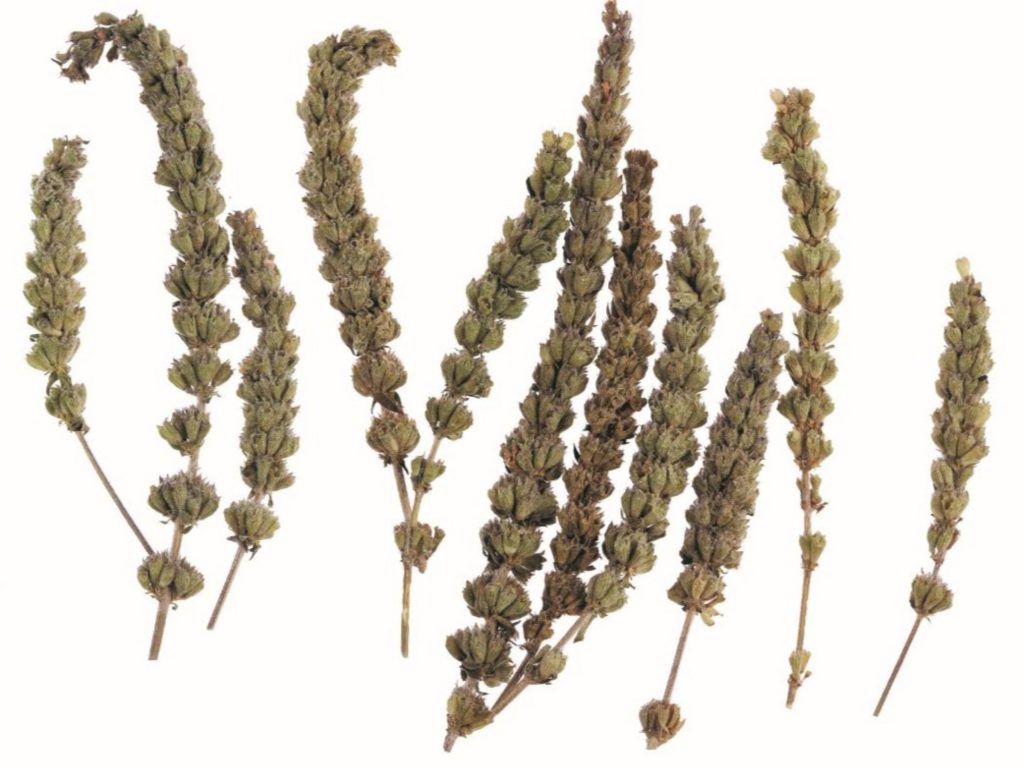Fineleaf Schizonepeta Spike

What is Fineleaf Schizonepeta Spike?
Fineleaf Schizonepeta Spike (jing jie sui, 荆芥穗), also known as Schizonepeta Tenuifolia or Japanese Catnip, is a flowering plant that resembles a thistle in appearance. Mostly cultivated in the Jiangsu, Zhejiang, Henan, Hebei and Shandong provinces in China, Fineleaf Schizonepeta Spike is usually harvested in Summer and Autumn. Its flowers are fully blossoming and its spikes are turning green by then. After being harvested, the herb is then cleansed, dried and cut into pieces for medicinal usage.
Frequently used for the treatment of common cold and nettle rash clinically, the green buds of Fineleaf Schizonepeta Spike are also one of the highly regarded pediatric sedatives. Fineleaf Schizonepeta Spike has a strong aroma, off-white pubescence and small flowers with funnel-shaped calyx and reddish purple crown.
In Traditional Chinese Medicine (TCM), Fineleaf Schizonepeta Spike falls under the category of ‘Warm/Acrid herbs that release the Exterior’. Such herbs can help to treat the early stages of diseases that affect the upper respiratory tract, the eyes, the ears, the nose, the throat or the skin.
Neutral in nature, Fineleaf Schizonepeta Spike does not affect the yin-yang balance in your body. Pungent in taste, the herb can promote the circulations of qi and body fluids in the body. In particular, the herb targets the Liver and the Lungs.
Functions and Benefits of Fineleaf Schizonepeta Spike
Traditional Chinese Medicine (TCM) shows that Fineleaf Schizonepeta Spike has the following health benefits.
Fineleaf Schizonepeta Spike can dispel Wind to relieve Exterior syndromes. TCM believes that External diseases such as colds or allergies can only invade the body if the external environment overwhelms our wei qi (卫气, immune system). In order to counteract this invasion, Fineleaf Schizonepeta Spike can induce sweating to expel the disease from the body and stop it from invading further. Hence, the herb can be used for exterior syndromes such as cold, fever, headache without sweating.
Also, Fineleaf Schizonepeta Spike can alleviate itching and rashes caused by Wind pathogens. For example, the herb can be used for skin eruptions, measles, urticaria, stress rash and boils when they first erupt, especially if accompanied by chills and fever.
In addition, when charcoaled, Fineleaf Schizonepeta Spike can stop bleeding. It can be used for hematemesis, epistaxis, hematochezia, metrorrhagia and metrostaxis, or other kinds of bleeding syndromes.
Other than the above Schizonepeta benefits, modern studies also suggest that Fineleaf Schizonepeta Spike, when used to make a decoction, may help to enhance blood circulation and increase the secretion of sweat. This decoction also can help to inhibit the growth of harmful bacteria such as Staphylococcus Aureus, the leading cause of skin and soft tissue infections, and Diphtheria Bacilli, a bacteria that usually affects the mucous membranes of the nose and throat.
The herb also has strong anti-inflammatory effects on inflammation induced by acetic acid, as well as a clear anti-alexin effect.

How to Use Fineleaf Schizonepeta Spike
The recommended daily dosage of Fineleaf Schizonepeta Spike is 5 – 10g, when boiled in water to be used as a decoction. Fineleaf Schizonepeta Spike Schizonepeta can be used raw, or after being baked until it turns yellow and black.
To prepare the raw herb, you can remove impurities on it by washing it thoroughly, baking it at 50°C for 1 hour, cutting it into sections and drying it after.
The raw herb is suitable for dispelling Wind, releasing the exterior and stopping itching. If the herb is charcoaled, it is more suitable for stopping bleeding.
Some healthcare practitioners also use Fineleaf Schizonepeta Spike as part of a poultice to treat certain skin conditions.
Dried, sliced Fineleaf Schizonepeta Spike can be found at many herbal stores and specialty shops. In addition, many stores sell Schizonepeta powders and decoctions.
Cautions and Side Effects of Fineleaf Schizonepeta Spike
Fineleaf Schizonepeta Spike should not be used by individuals who are experiencing weakness of the exterior marked by spontaneous sweating or susceptibility to cold and flu. Also, the herb should not be used for sores that have already erupted.
Fineleaf Schizonepeta Spike should also be used with caution by individuals with Liver diseases or sensitive skin. Otherwise, it is very likely to cause unexpected adverse reactions such as swelling, aggravation of Liver diseases and allergic reactions.
As the effects of Fineleaf Schizonepeta Spike are unknown for pregnant and breastfeeding women, it is best if they refrain from consuming the herb for the time being. As always, we strongly encourage you to consult your healthcare provider before adding Fineleaf Schizonepeta Spike to your healthcare routine.
Summary
Here is a summary for Fineleaf Schizonepeta Spike:
- Herb name (Chinese): 荆芥穗
- Herb name (Pin Yin): jīng jiè suì
- Herb name (English): Fineleaf Schizonepeta Spike
- Herb name (Botanical): Spica Schizonepetae
- Origin of species: Schizonepeta tenuisfolia Briq.
- Part(s) of herb used: Fruit spike
- Geo-specific habitat(s): Jiangsu, Zhejiang, Henan, Shandong
- Taste(s) & Properties: Pungent; Slightly warm; Administrates the Lung and Liver Meridians
- Actions: Relieves symptoms of influenza, headaches and skin irritations
References
Ferris, H., & Zheng, L. (1999). Plant sources of Chinese herbal remedies: Effects on Pratylenchus vulnus and Meloidogyne javanica. Journal of nematology, 31(3), 241. [Accessed on 4th November 2022]
Wagner, H., Püls, S., Barghouti, T., Staudinger, A., & Melchart, D. (2017). Spica Schizonepetae–Jingjiesui. In Chromatographic Fingerprint Analysis of Herbal Medicines Volume V (pp. 183-192). Springer, Cham.[Accessed on 4th November 2022]
Wang, X., Jia, W., Zhao, A., & Wang, X. (2006). Anti‐influenza agents from plants and traditional Chinese medicine. Phytotherapy Research: An International Journal Devoted to Pharmacological and Toxicological Evaluation of Natural Product Derivatives, 20(5), 335-341.[Accessed on 4th November 2022]
Share this article on
